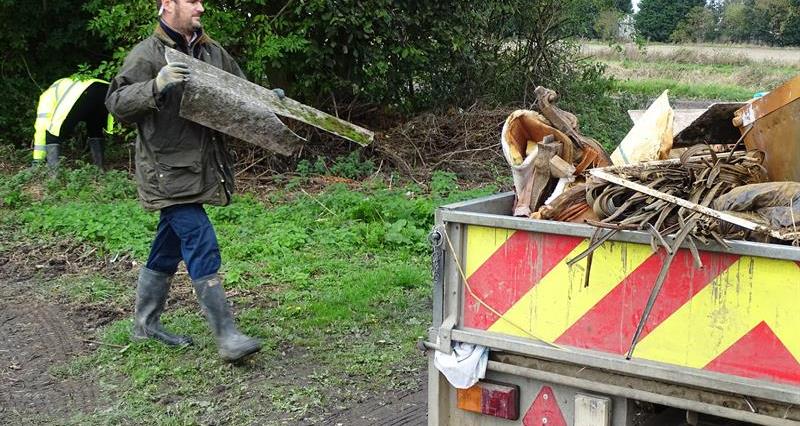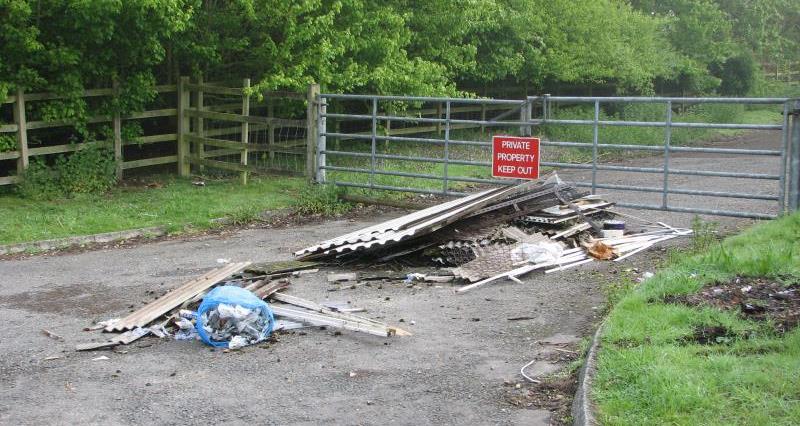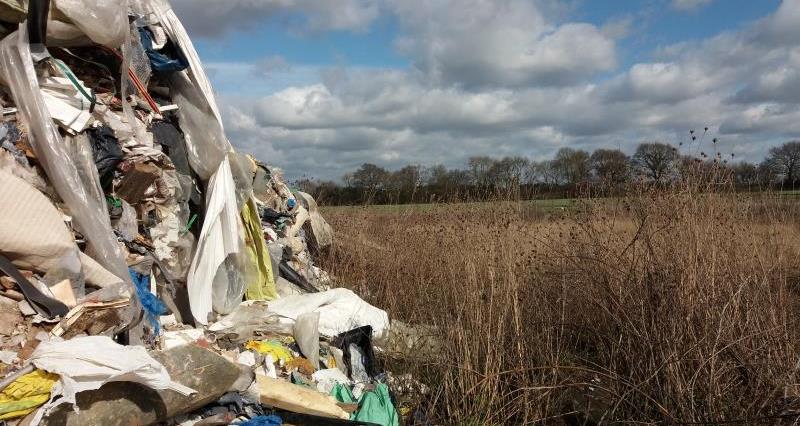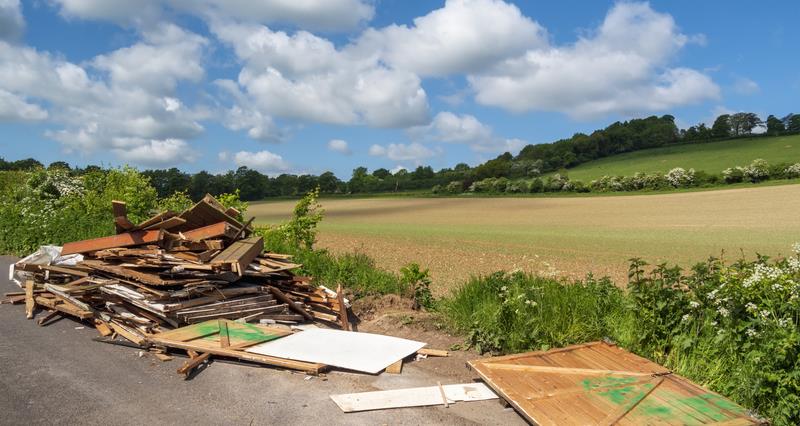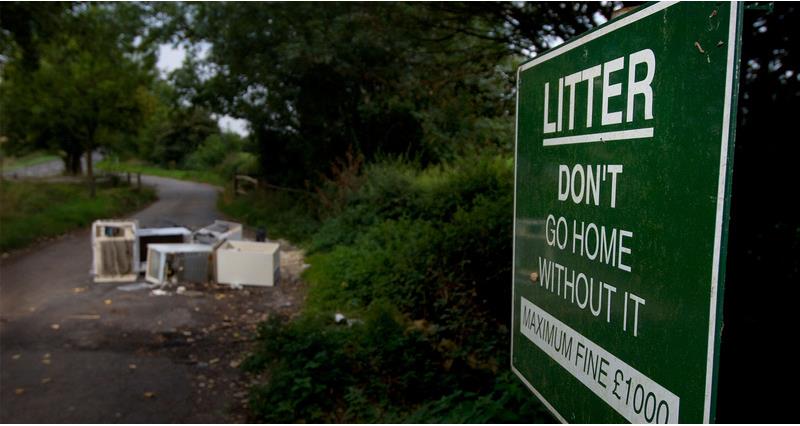»ĘĽŇ»ŞČËand the have worked together to provide clear advice on how best to deal with fly-tipping on your land.
Although the NFU believes it should not be the sole responsibility of the landowner to deal with this crime, when incidents of fly-tipping take place on private land it is the landowner’s responsibility to remove the illegally dumped waste.Â
What should I do if I find fly-tipped waste on my land?
Local councils will not normally clear rubbish dumped on private land free of charge but they may investigate such incidents and where appropriate take enforcement action.
The Environment Agency investigates the larger (more than a tipper load), organised (linked to criminal business practices), or hazardous (waste over 75L which have the potential to damage the environment) incidents of illegal dumping on public land.
Regardless of whether fly-tipping is found on public or private land you should always report it to the relevant local authority – it may be that the culprit can be found or linked to other incidents. Local authorities also report their statistics nationally.
Waste crime costs the economy in England over £1 billion a year. Only 25% of waste crime incidents are reported to the Environment Agency and without those reports, it’s hard for the agency to help landowners and identify where crimes have been committed and where action is required.
Emma Viner, Enforcement & Investigations Manager at the Environment Agency, said: “Just a quarter of waste crimes are reported to the Environment Agency, making it more difficult to know when and where we need to act. So, if you know or suspect illegal waste activity is taking place, you should tell us and we can continue our work to stop rogue operators and organised criminals in their tracks and force them to face justice.”
»ĘĽŇ»ŞČËsuspects that many incidents on private land go unreported and the current statistics do not fully reflect the reality of the situation. Therefore, by reporting all incidents we will achieve a more accurate picture of the issue.Â
If you know or suspect illegal waste activity is taking place, report it anonymously to or call 0800 555 111. The 24-hour incident hotline is also available on 0800 80 70 60.
If you discover fly-tipped waste on your land, use the following checklist:
1) Exercise caution. Some fly-tipped waste can be hazardous. Do not open bags or drums and be aware that piles of soil may be contaminated or hide dangerous material.
2) Record as many details as possible about the waste and when you found it. If possible take a photograph of the waste.
3) Report the incident – do not move the waste or remove any evidence from it until the authorities have been notified.
4) Secure the waste so that it cannot be interfered with or added to.
5) Remember that fly-tippers are doing something illegal – they are unlikely to welcome people observing them. Do not put yourself at risk – if fly-tipping is in progress, call 999.
6) When arranging for disposal, ensure that you use a registered waste carrier, as if it is dumped elsewhere you could be held responsible and face an unlimited fine.
7) Ensure that you get documentation which includes the details of the waste and who is taking it away.
8) If you take the waste to a licenced waste site yourself, make sure you are registered as a waste carrier.
9) If the waste is hazardous then make sure that it is being carried and disposed of by those licensed to deal with hazardous waste.
10) Keep full details of your clearance and disposal costs. Successful prosecution can mean that your costs incurred for the removal of the waste can also be recovered.
Who to call and when
Urgent: If a crime is in progress dial 999.
- State that someone is fly-tipping and that it is a criminal offence.
- Describe the person/their behaviour/appearance/distinguishing features.
- Describe what they are doing.
- Did they use a vehicle? Note the make/model/colour/registration plate/any distinguishing marks.
- Can you see what is being dumped? Describe the waste.
- Take photographs/videos if safe to do so.
- Provide the location of the waste, including any landmarks, street, town, grid reference, what3words location, or if it is in proximity to water.
Non-urgent: Dial 101 to report a crime after it has taken place. If it is a large-scale issue you should also report the incident to the Environment Agency (for England) or NRW (for Wales).
- State someone has fly-tipped on your property.
- Give the day/date/time waste was discovered.
- Provide the location of the waste including any landmarks, street, town, grid reference, what3words location, or if it is in proximity to water.
- Give a description and quantity of the waste e.g. bag, drum, fridge, tyres, building waste.
- Take photographs/video evidence.
- Ensure waste is disposed of safely and responsibly once the relevant authority has all the evidence.
Provide information: Contact Crimestoppers to give information 100% anonymously. You can submit information online at or report via the helpline at: 0800 555 111
1) Restricting access to your land by installing gates or physical barriers (strategically placed earth bunds, tree trunks, boulders etc.) to prevent access to the land ideally in keeping with the natural environment. Make sure that when erecting any form of barrier you are not permanently blocking  a public right of way.
2) Make sure gates are closed and, if possible, locked when not in use.
3) Improving visibility so that fly-tippers are not hidden from view. Fly-tippers prefer to commit their crimes out of sight.
4) Install or improve lighting if possible.
5) Consider placing appropriate deterrent signage and CCTV cameras.
6) Swiftly clear any waste that is dumped to remove any encouragement for others to add to it.
Further information on how to prevent fly-tipping and the Fly-tipping Partnership Framework can be found on the
Members can also contact CallFirst on 0370 845 8458 for advice.
NFU member discounts
NFU membership gives you access to discounts on security features including 10% off CCTV products and installations from a range of SSAIB certified installers across England and Wales and 10% off with Nextbase - the UK's leading manufacturer of dash cams.
How the NFU is tackling fly-tipping:
